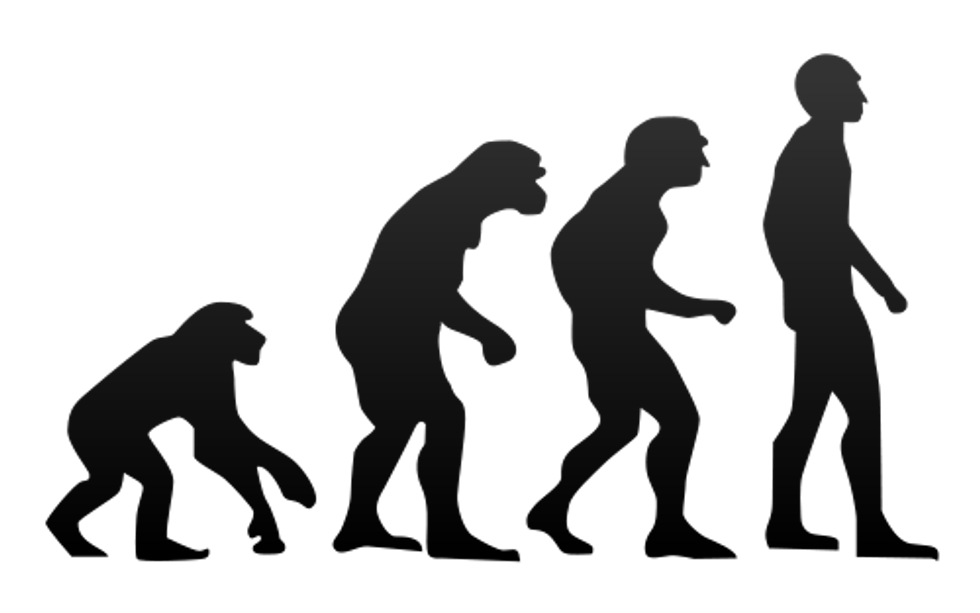1. What church do you go to?
This one seems really innocent, but at its heart is a blatant Christian privilege. People will assume — especially in the Bible belt — that you are Christian and that you go to church. In Michigan I haven't experienced this much, but I have occasionally been asked.
Thankfully nowadays I actually have a productive answer instead of the seemingly disappointing, "I'm an atheist, so I don't go to church" or the entertaining answer, "I'm a satanist, so I find a dark cave where I can be alone with the lord Satan and relinquish my soul to the underworld." Instead, I can say that I go to Sunday Assembly. Sunday Assembly is basically like church but for the non-religious. From attending a Sunday Assembly in Chicago and the opening session in Detroit I can speak a little bit to what Sunday Assembly is. As with any church, the feel to each one is different. In the Chicago chapter, they really liked the Beatles, so instead of singing creepy songs about being bathed in the blood of Jesus or the virgin Mary or whatever, we were singing Yellow Submarine and remembering that all our friends are all aboard and many more of them live next door.
Instead of praying, we took a few minutes of silence to think, to remember, to plan our lives, to relax, to meditate - whatever it is possible to do in your mind in a few minutes of silence. We had a few minutes to meet with everyone like in a Catholic mass. Most importantly, they have a positive message.
At the first session of the Detroit chapter we got the message about how something is always greater than nothing. We heard about the Detroit mower gang. Yes, mower gang. A gang of folks who go and mow the parks in Detroit that the city can no longer afford to maintain. They did it for the kids in the area who would use the parks if they were maintained.
The heart of the story was about how when the gang was in an infantile stage the founding member made only one short pass into the thick grass of the park before his mower died. He was incredibly discouraged but then he realized that even that small act - that practically unhelpful line of mowed grass - still sent a message. It told people that someone cared about this park enough to try. It reminded him that something is always greater than nothing.
So what church do I go to? A secular church of course! Want to join?!
2. If humans came from monkeys then why are monkeys still here?
Oh, boy. This one used to get my blood boiling. Not because it is a difficult question to answer, but rather because it is usually asked in such a "checkmate atheist" manner.
The question is really incredibly silly. It's kind of like asking, "If Mexicans came from Belgians, then why are Belgians still here?" Humans didn't come from monkeys just like Mexicans didn't come from Belgians.
Even if humans did come from monkeys it doesn't mean that monkeys couldn't still exist. If you think that if something comes from another thing then the first thing must destroyed then you completely misunderstand the process of procreating. It's much like asking, "If a child comes from its parent, then why is the parent still here?" It's a nonsense question.
The answer is that modern monkeys and humans both came from a distant cousin that was ape-like. Think of the letter Y. The crotch of the Y is where the species of monkey and human started to split from each other and become distinct species. Do that split enough times and you get the tree of life. Evolution is really pretty easy to understand.
3. Isn't evolution impossible according to the second law of thermodynamics?
This one is a little more understandably confusing. The confusion is mainly due to the complexity of thermodynamics. Plus, if one were to bring up the question of thermodynamics, it shouldn't be in regard to evolution, it should be in regard to the origin of the universe - which is much more interesting.
Anyway, the second law of thermodynamics states:
The total entropy [disorder] of an isolated system [think of a car floating in purgatory] always increases over time, or remains constant in ideal cases where the system is in a steady state [jargon not relevant to the discussion] or undergoing a reversible process [like a box sliding one way on a frictionless surface. Sliding it back to where it started is reversing the reaction... I know, it's almost uselessly abstract, but not when you plug in numbers. Just trust me.].
Having taken a class (or several classes) on or using thermodynamics, I can tell you that the word definition is the easy part and the mathematical definition is where it gets tricky. For this article we only need to know about what the words are saying. The key words here are "isolated system". People like to think that Earth is an isolated system (especially if they don't like the idea of aliens), but Earth is actually not an isolated system. The reason that the Earth isn't isolated is because we have the sun!
The sun is a giant ball of fusioning Hydrogen, Helium, and other heavier elements and it is producing an amazing amount of energy - only a fraction of which we are actually receiving (thankfully). Whatever energy gets to us in the form of light is split into two categories: reflected and absorbed energy. Some of the energy is reflected away from the earth and the rest of it is trapped on earth (more of which is trapped each year #GlobalWarming). The energy that is trapped on earth can cause order instead of disorder (with the exception of a really strong solar flare... then everyone freaks out and it is generally more chaotic).
Think of your room as the earth and you as the sun. Without you actively cleaning, the room gets more and more dusty. You are adding energy to the system and it is getting more organized. So unless you consider cleaning your room a violation of the second law of thermodynamics (go ahead... try using this with your parents), there is nothing about evolution that violates the second law of thermodynamics.
4. Isn't the complexity of the eye proof of the wonders that God created everything?
No.
I feel like leaving it at that, but I guess I should explain. The argument goes that there is no way that a complete human eye could've just popped into existence via evolution.
Obviously. I couldn't agree more.
It's obvious because that's not how evolution works. The human eye didn't go from no eye to fully functioning human eye - it had stages. "What's the point of half an eye?", you might ask. And it's a good question.
Say you're a little plankton or something floating about in the water, It would be really nice to know if there is a predator above you, or if there is a source of light in some direction where you can get heat or energy. It would be really nice if you had even just a light receptor. Something that tells you if there is light or dark.
However, it would be even better if you had a bunch of them so that you could see more. Even better is if your body made a pinhole camera so that you can see the world - with more clarity - and have your light receptors safe. It would be even better to have color and the ability to focus and move your light receptors without having to move your whole head or body!
Maybe you can see how each baser feature must first exist before the other, more complicated, features can exist. At some point in human history it became very important that our eyes had such complexity, but we built up to this point and our eyes are far from perfect. Some animals only have light receptors in cups for eyes such as planaria, others have pinhole cameras for eyes like the nautilus. We got the eyes we did, but our eyes are far from complex when compared to animals such as the mantis shrimp.
Why our eyes evolved is the same question as to why the wing evolved. Although it may not seem like there is much of an advantage to having half a wing, half of a wing can make you drop to the ground slower or run a little faster while you flap it which may save your life or help you get more food. The same thing happened with the eye - it helped our ancestors survive more than others in our species that didn't have a more complicated eye. The more advanced eyes ended up being better than less advanced eyes creating a survival of the fittest condition.
For more information about the evolution of the eye check out this really cool website that breaks it down with fun picture and animations!
5. So you believe in nothing?
Of course I believe in something! Check out my other article on this here.
And as always, stay educated my friends.



























